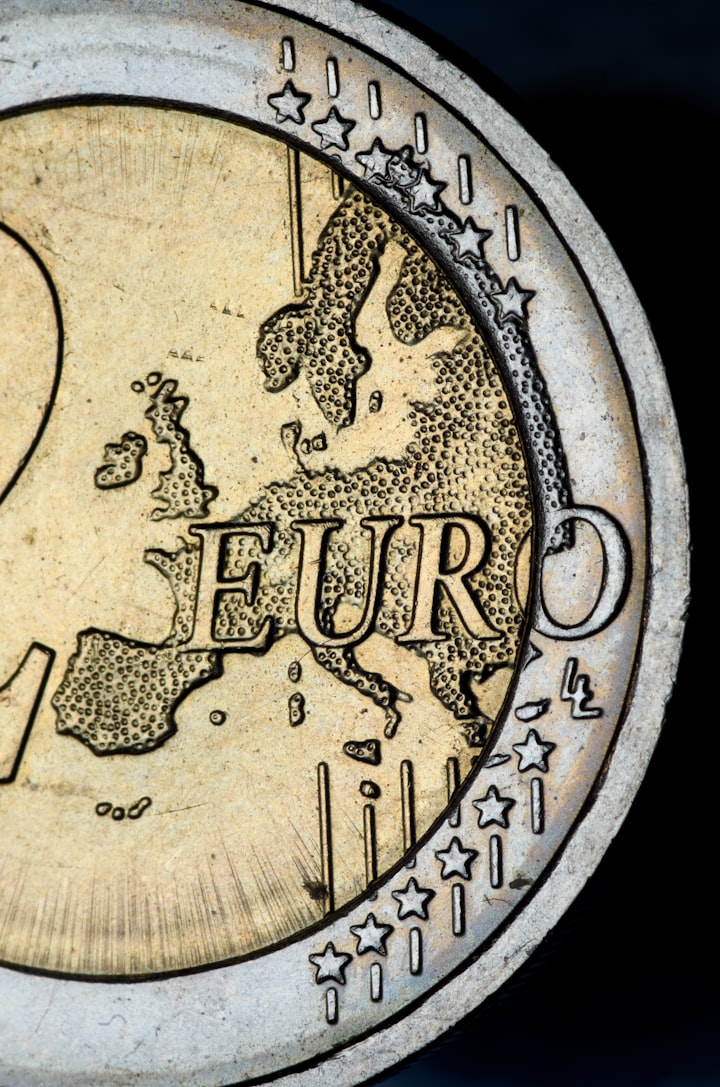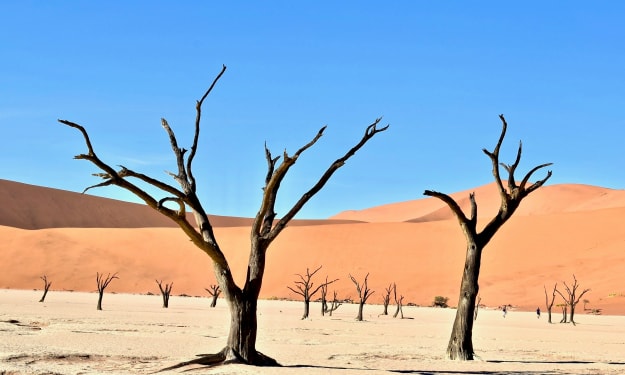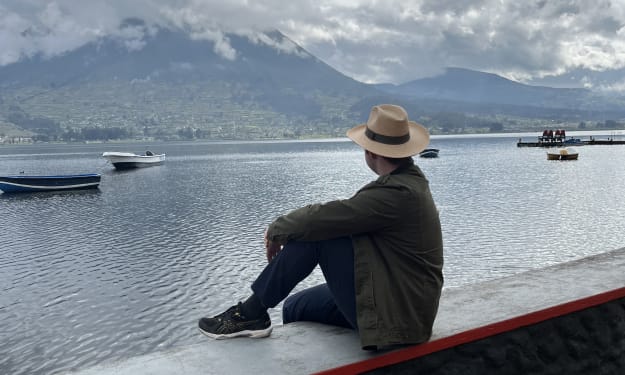
Two years ago, nearly to the day, I began a story about a man walking his dog. Some of you had read it; The Trees Swallow People. Over the next two years, I continued to expand a short story into a 45K horror story about mania, depression, cults, supernatural trees, and a little Yorkie called Diva. Now, not only is it available to read in its entirety, it's a published podcast series on Spotify and audio-book on Audible. You can go to Spotify, Youtube, or any good podcast platform and listen to all 6 hours, across 24 episodes, for free.
Six months from when I got the funding, a month recording, three months editing, I'd like to share what I've learned in the hopes it may help you on your own podcast journey.
Funding
Funding came as a surprise. I'm sure fellow creatives know the feeling of applying for so many submission calls that when you eventually get the rejection letter months later, it hurts less than you expected because you don't even remember what you submitted.
A local county council put out the call for a few open calls, including a bursary grant for time and equipment at a local recording studio. I applied to at least three (the recording grant, a publication grant, and a retreat grant), thinking nothing of it. A month later, I found my pitch to record a horror podcast series was accepted. Recording took place in July.

While I had planned to record the podcast that summer with or without the funding, it offered more than time and equipment.
Structure in having set dates, especially months ahead, meant I had deadlines for proof-reading, brainstorming direction, sourcing music, and rehearsing. It also meant I had a sound engineer to bounce ideas off, maintain levels and quality, and keep track of time. Anyone who studied or worked in production may be familiar with the production triangle.

The basic idea is all productions require three elements; time, money, quality. To have two traits be advantageous for you, you must be willing to sacrifice the remaining element. Ideally, you should never sacrifice quality just to save money or have a quick turnaround. Marvel is a prime example of why! The funding allowed for me to have the time and quality I needed. Money was the difference between three months editing sixteen hours of audio, and God only knows how long editing how much! It's doable, but now you're sacrificing time and hurting the project with delays. Not ideal if you're also working to upload deadlines like I was.
Spotify & RSS Feeds
"Podcast" isn't just a fancy name. In fact, most podcast platforms are actually "podcatchers", picking up RSS Feeds from hosts. Simply put, think of it like tradition radio; a signal is sent out and picked up by your receiver. Likewise, a host (I used Spotify) allows apps to see your podcast. You can, and should, submit your RSS Feed to as many podcatchers as possible (Apple, Amazon, Good, TuneIn, Castbox, etc). Your host will give you your RSS Feed. You may even find your podcast is already added, be it by a listener or a bot. Podcasts aren't monetized typically, and your RSS Feed will count all listens, so this isn't a case of someone stealing your content, but rather boosting it. You can offer "locked" episodes for monthly subscribers, but personally I decided against that.

Sourcing Music & Sounds
The bursary grant only covered time and equipment to record my narration. Whatever music or sounds I needed would need to be sourced outside of that timeframe. Luckily, I came across by chance a website called Pixabay.com. Don't worry, this is a paid sponsorship (unless Pixabay is reading this right now, and you'd to send me a little something… no?). Pixabay offers royalty free images and videos, but it was the music and sound effect library that blew me away with extensive offerings.
The way it works is the featured artists offer their music Royalty-Free, meaning you do not need to buy the song or the licence. THIS PART IS IMPORTANT! The music and songs are NOT copyright free or public domain. The artists and representation, unless otherwise stated, own the copyright; they own the right to determine how the works are distributed, commercialised, or sold. Each artist specifies their expectations, but the most common decision taken is that you are free to use the works in your own work (like a video, or film, or, in my case, podcast). It is very important that you read each artist's expectations and allowances carefully, as they may wish you to give credit to them for their work, and download a licence to deflect copyright claims. To give you an idea of what this entails, every single episode of my podcast was copyright struck, and every one of them required me to upload the corresponding licence, giving me permission from the artist to use their work. If I didn't have that, I would have to go frantically looking for it back on the Pixabay. As if to give a perfect example of why all this is important to get right, a song I used was taken down from Pixabay, but the license I had already downloaded stood when I was struck. Had I not crossed my T's and dotted my I's, there would be an entire section of my podcast I'd have to go back to a re-edit.

And while again, you don't have to pay them, donations are accepted, and really, why wouldn't you donate to them! I did! But if you are stuck for cash, that's okay. Just give credit, link to their work, and encourage others to give if they can.
Editing
160 hours of editing 16 hours of recordings into a 6 hour series over three months… I am extremely tired… I'm only half joking when I say I honestly feel traumatised… I don't want to edit anything for the rest of the year…
Da Vinci Resolve is a good option and has a free option (certain features are unavailable unless paid for, but really you don't need them to just edit audio).
… I mean it, this kind of broke me.
… Keep levels are ten if possible. The "limiter" option is good for capping peaks (you'll find it in audio effects).

… I think I hate editing now.
Promotion
We're in the best time ever for creative expression, yet the worst time ever for those who do it. Everything is just white noise. We're all tethered to algorithms and ad-friendly ToS. Being a creative now means being both the show and the PR team. You need to use both sides of your brain. You have to ask, "who is this for?" And no; you can't say "everyone". You have to find out where your tribe hangs out. For this, a dark single-narration audio-drama horror with a strange premise, the most promising places have been the most niche; subreddits, boards, and random strangers looking for the esoteric.
I'm reminded of the ARG enthusiast, Nightmind, who explored the topic of promotion through a survey he conducted, and found that despite self-promo being seen as "tacky", it is the only tried-and-true method of getting an audience online. Yes, don't be spamming cooking subs or begging Instagram for virality, but if people are asking, tell them! People want you, but you have to find them, not force them.
I tried my hand at promoting the series through TikTok and Youtube Shorts. For views, Shorts blew TikTok out of the water. Youtube may still be playing catch-up, and this may be willing to experiment more, but TikTok seems too solidified now to just randomly break-in. TikTok wants to show the same thing you've previously watched, especially under the same tags. More people want the same dance routine twenty thousand times than something they're not sure about. They're only human, but like I said, don't cast a wide net.
Avoid My Mistakes
No journey would be worth going on unless there were bad decisions made. If you're going on your own podcast adventure, please avoid these mistakes I made.
WATER!
If you think you have too much with you, you don't! Drink litres before, during, and after recordings. You are talking non-stop for hours. Your vocal chords, tongue, and lips are your legs in this marathon. Water helps keep your voice clear and strong, washes away saliva built up that could sound "sticky", and it'll keep you from coughing, clearing your throat. I easily have hours of me grunting to clear my throat. We had to cut the second day short because my voice was becoming dry and worn, even with regular swigs of water. Though he still got the entire series done, I had lost at least two hours of time. That is how much of a difference it makes; two hours could be two or three episodes recorded or two or three episodes short.

Review "Dailies"
The recording sessions took three days over three weeks; effectively the month of July. Because I was using the week intervals to rehearse for the next session, I avoided reviewing the previous session. Usually, the narrator, director, and editor wouldn't be the same person. I didn't have that luxury, and as such, I focused on rehearsals, thinking I could put my editor hat on later.
While not a bad way to compartmentalise, it meant weeks later I would come across a misread, incorrect levels, or a take I wish I could have done again. Had I reviewed the "dailies" (typically reviewed at the end of a day's work), I could have made note of retakes needed. If you listen, you may pick up my Franken-bites, gritty gains, or pops. I did the best I could to fix issues, but nothing is more fixed than replaces.
You NEED Promotion!
As much as I managed to do with promotion, I knew my limit. For three months I was juggling editing with scheduling episodes, posting updates, and sourcing music and sounds effects from Pixabay. My hands were already full, so I avoided giving myself anymore work with Twitter, Facebook, TikTok, and such. Though clearly power-houses of gaining traffic, I was humble enough to know those in and of themselves are practically full-time jobs. While I had creative freedom and authorship in writing, directing, narrating, and editing, promotion, especially on social media, should be handed off to someone else.
At the time, my brother was unemployed, and I was floating the idea of paying him to handle social media for me; do an hour of work once a week, posting about the recently uploaded episodes, mostly as a brother gesture, though I was hoping he'd say yes. I wouldn't expect posts about an obscure horror series to go viral, but I can never say for certain how many more listeners I could have added.
My point; get someone on promotion. Anyone! Pay what you can, call favours, give someone something to put on their CV, but you need someone! You already do enough. Let someone else show you off.
Scheduling
My plan was to upload the 24 episodes weekly, two at a time, ending on Halloween, meaning I'd start publishing episodes on the 15th of August. While not a bad idea, there were two hinderances to this. As mentioned, RSS feeds are sent out. Podcasts you're subscribed to will show the most recent episodes first. The issue here is it doesn't go by timestamps, rather whenever the podcatcher checks the RSS Feed, which can vary between four times a day or only once a day. The podcatcher assumes the latest episode is the only one uploaded that day. In my case, I'd upload two episodes at once, but only the second one would be seen. As you can imagine, this led to asymmetrical views.
I "corrected" this by having the episodes set six hours a part (12 am and 6 am, GMT). By accident, this was read in different time-zones as an episode on Monday and Tuesday, further ensuring episodes were seen equally.
The second hinderance was I have wasted 24 weeks of content in only 12 weeks. Most series tend to be weekly or biweekly, but I had fallen in love with the idea of people following along week by week, two episodes at a time, ending on Halloween gone. But I forgot the name of the game is engagement. It's no coincidence I've slowed down in views as soon as I stopped uploading. Platforms want to keep people engaged, keep them returning; they're not going to be doing that as much with something they can see is finished. And the irony is that, though the few people who listened religiously got the experience I intended, it's not like when the episodes were uploaded matter; they're out there now. The majority of people who'll hear them will after the original run. For all I know, the series could blow up twenty or forty years from now.
If you can, try to stretch at the series to weekly or bi-weekly, because I'm kicking myself now; I could have a series that could still be going for six months if not a whole year.
Set Everything Up First
Strangely, starting a podcast is not the first thing you should do. In fact, it may seem like you should do everything else first. What I mean bu this is one of the first things you should do is set up a podcast Gmail, once you can verify with your personal email, though keep that as separate as possible. There's two reasons for this.
First, it's needed to sign up with your podcast host, and for any other relating accounts you may need (Social Media, Kofi/Patreon, websites, royalty free music, etc). As well as that, you automatically have cloud storage (Google Drive) and a video platform (Youtube). This is all stuff you'll be looking to get into eventually, so it just cuts out so much hassle if you can just click "sign in with Google".
The other reason is it gives you a chance to see if your name is truly original. It's going to be hard to call your podcast something like "The Witching Hour" is your email is [email protected] (I'm too scared to check if that's a real site). Jokes aside, though it may seem amateurish, a consistent naming convection across multiple avenues will give you both a sense of polish and a chance to cement the name in people's brains, wherever they are online.
Final Thoughts
I never sought out to write a podcast series. In fact, originally I just thought this was a fun way to burn the dying days of the final Covid lockdowns here in Ireland. As much advice and tips as I've given here, I really can't say I had a plan or expert experience to show off. I may never make anything like this again. But I'd like to think the key here is to just be open to new experience, chance your arm, practice when you get the chance, know your limits and ask for help, and just put yourself out there.
Only other thing I can say is if you're interested, you can check out the podcast series here.
About the Creator
Conor Matthews
Writer. Opinions are my own. https://ko-fi.com/conormatthews
Enjoyed the story? Support the Creator.
Subscribe for free to receive all their stories in your feed. You could also pledge your support or give them a one-off tip, letting them know you appreciate their work.






Comments
There are no comments for this story
Be the first to respond and start the conversation.